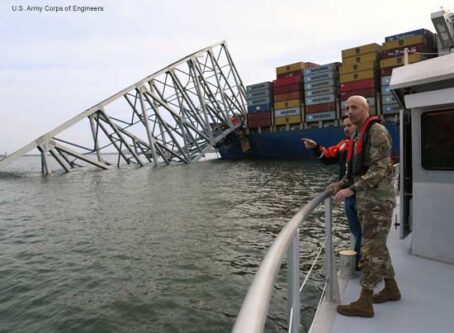Pittsburgh bridge collapses same day Biden visits to talk infrastructure
The Forbes Avenue Bridge in Pittsburgh collapsed on Friday, the day President Joe Biden visited the city to talk infrastructure in a state that is trying to address major bridge problems.
Pittsburgh Public Safety is reporting that the Forbes Avenue Bridge in Frick Park collapsed at 6:39 a.m. on Friday, Jan. 28. Five vehicles and one Port Authority bus were on the bridge at the time. Pittsburgh Mayor Ed Gainey said there were no reported fatalities or critical injuries.
According to a spokesperson for the city of Pittsburgh, 10 people were evaluated and treated for minor injuries, including some first responders. At least three people were transported to local hospitals with nonlife-threatening injuries. Responders had to rappel around 100-150 feet. Rescue operations ended at around 8:30 a.m.
Making matters worse, the Forbes Avenue Bridge collapse caused a massive gas leak, according to Fire Chief Darryl Jones. Nearby residents were temporarily evacuated. The Red Cross has set up a victim assistance unit in the area.
The cause of the collapse is under investigation. Frick Park is closed to pedestrians and vehicles as crews continue their work. Rep. Mike Doyle, D-Forest Hills, said the bridge collapse will disrupt transportation in Pittsburgh for at least months. The National Transportation Safety Board is sending a “go-team” to the scene.
A tweet from Dec. 28, 2018, appears to show the Forbes Avenue Bridge severely damaged by rusted beams.
Land Line could not immediately verify the photo is the same bridge that collapsed. The Pittsburgh 311 Response Center replied to the tweet with a service request number. That service number reveals a location of Forbes Avenue. The status of the service is marked as “closed.”
@Pgh311 I hope someone is keeping an eye on the underside of the Forbes Avenue bridge over Frick Park? One of the big “X” beams is rusted through entirely (and, yes, I see the cables, so it’s probably not a crisis). pic.twitter.com/UQScawPEGQ
— Dr. G Kochanski (@gpk320) December 29, 2018
According to PennDOT’s bridge condition database, the rigid frame Forbes Avenue Bridge was built in 1970. Both the deck and superstructure conditions are rated as poor. The substructure condition is considered satisfactory.
Ironically, President Joe Biden wqas scheduled to be in Pittsburgh on Friday to talk about his infrastructure bill. President Biden visited the scene while in the area.
“I’ve been coming to Pittsburgh a long time and as a former Pennsylvanian,” Biden said. “But I didn’t realize there are literally more bridges in Pittsburgh than in any other city in the world. Did you know? More than in Venice. We’re going to – they’re going to fix them all. Not a joke. This is going to be a gigantic change. There’s 43,000 nationwide, and we’re sending the money.”
Major Bridge P3 program
On Jan. 14, Pennsylvania Department of Transportation Acting Deputy Secretary Mike Keiser highlighted the infrastructure bill’s benefits to the state, specifically as they pertain to Pennsylvania bridges.
“This is a tragic example of why the #infrastructure bill Congress just enacted is needed,” Rep. Doyle posted on Twitter. “We should be constantly investing MORE in our infrastructure so our bridges and other public works don’t reach this point of disrepair.”
Of the $4 billion Pennsylvania will receive from the infrastructure bill in new federal highway and bridge dollars, about $1.6 billion is allocated for a new bridge program created by the bill.
“The passage of the Bipartisan Infrastructure Law is the largest federal infrastructure investment in decades, and the largest ever investment for bridges specifically,” Keiser said in a statement. “PennDOT – along with our partners – are ready to put these dollars to good use in meaningful projects all over the state.”
According to PennDOT, Pennsylvania has one of the largest state-maintained bridge networks in the nation, with more than 25,400 bridges maintained by PennDOT. That number grows to about 32,000 bridges when considering the state and local networks. The Forbes Avenue Bridge is owned by the city.
In November 2020, PennDOT received approval to charge tolls for its Major Bridge P3 program. The program is intended to accelerate the reconstruction and rehabilitation of major bridges in partnership with the private sector. According to a news release, this may be accomplished by considering user fees – i.e., tolls.
However, the Major Bridge P3 program was met with criticism from local lawmakers. Last November, the Pennsylvania House approved a bill to address what has been described as an “aggressive overreach” on tolling bridges. House lawmakers voted 125-74 to advance a bill to reform the public-private partnerships statute. Specifically, SB382 would halt the current bridge toll plans. Senate lawmakers voted in the spring to approve the reform legislation. LL









